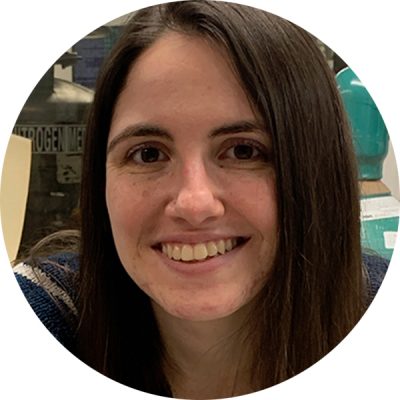
P. Aitana Azurmendi
I am a student in the Johns Hopkins Post-baccalaureate Research Education Program (PREP), working in Sandra Gabelli’s lab in the biophysics and biophysical chemistry department. My work is focused on tailoring g bisphosphonate inhibitors of farnesyl diphosphate synthase (FPPS) as lead compounds for new drugs that target leishmaniasis. I have determined the crystal structure of Leishmania major FPPS in complex with a series of nitrogen-containing bisphosphonates. We have measured their binding kinetics and performed cell assays to discern the features that are ideal for inhibition in vitro and in cells. This is important as, currently, there are no vaccines or drugs to prevent infection, and current treatments have high toxicity and generate drug resistance. Bisphosphonates represent a safer, compelling alternative for the treatment for leishmaniasis as they are currently being used for treatment of osteoporosis. We also hope to utilize these inhibitors against other parasitic diseases such as Chagas disease.
Questions & Answers
Why did you choose Johns Hopkins for your work?
I spent several summers during undergraduate in Dr. Gabelli’s lab. I chose Hopkins because of the mentorship bond I had with Dr. Gabelli. I wanted to experience and expand on my structural biology knowledge beyond the limitations from working in the summer. I knew that at Johns Hopkins, I would be surrounded by groundbreaking research and have numerous opportunities to personally witness the progression of science and innovation.
What does receiving this award mean to you personally and professionally? Do you have any connection with the particular award you received?
I feel honored to receive the first Postbaccalaureate Award among the numerous talented postbaccalaureates here at Johns Hopkins. This accomplishment rewards the effort I have put into my project and motivates me to continue my work with the highest quality.
What contributed to your project’s success?
My mentor and PI, Dr. Gabelli, who has provided encouragement and pushes everyone in the lab into numerous projects and learning endless new skills. I also have been personally mentored by several postdocs in our lab: Katie Wright, Michelle Miller and Sweta Maheshwari. All three have taught me and helped me grow, and I will forever be grateful to them. I have also learned from my experience at PREP and my interactions with my committee members, Shibin Zhou, Jennifer Kavran and Katie Wright, and program director, Kathy Wilson. They have helped me expand and polish my presenting and writing skills. Last, but certainly not least, my family is a constant stream of support and encouragement.
What thoughts do you have about Young Investigators’ Day itself, as a celebration of the roles students and fellows play in research at Johns Hopkins?
Young Investigators’ Day highlights the work of researchers at Hopkins at all stages, and gives inspiration and encouragement to attendees. Through YID, we can appreciate the work of our peers and celebrate them. I think this provides a closer sense of community at Hopkins, which I really appreciate.
What has been your best/most memorable experience while at Johns Hopkins?
My most memorable experience was getting stuck in the elevator during my first summer at Hopkins. My best experience has been the labwide picnic held each summer. I hope to experience another one before my time here ends.
What are your plans over the next year or so?
I look forward to continuing on in my current position and publishing my work in the near future.
Tell us something interesting about yourself.
I enjoy traveling, hiking and eating new foods. During the pandemic, I have only been able to indulge in the latter, but I hope to take part in my other two interests in the coming months.